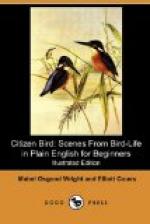“Then the farmer begins his annual war upon them, and day after day he fights the Battle of the Bugs. But if he stops to think, and remembers that Heart of Nature has a use for everything, he will win this battle against the creeping, crawling, squirming regiments more easily. For above him in the trees of his forest, in the hedgerows and bushes of his pasture and garden, on the rafters of his barn, even in the chimney of his house, live the birds, willing and eager to help him. And all the wages they ask is permission to work for a living and protection from those of his fellowmen who covet the Oriole and Cardinal for their gay feathers and the Robin and Meadowlark for pot-pie.”
“Singing-bird pie is wicked. I would like to pound them all,” said Dodo, striking her fists together, as Nat did sometimes, not making it clear whether it was pie or people she wanted to pound. “But uncle, it is right to eat some birds—Ducks and Chickens and Geese and Turkeys.”
“Yes, Dodo, they belong to another class of birds—a lower order that seem made for food—not singing nor helping the farmers; but even these should not be shot needlessly or in their nesting season. But the higher order—the perching Song Birds—should never be shot, except the common Sparrow of Europe that we call the English Sparrow. His habits are wholly bad; he meddles with the nests of useful birds and is a nuisance to his human as well as bird neighbors.
“To prevent confusion Heart of Nature has divided the habits and appetites of Birdland, so that instead of a great many families all building in one kind of tree, or eating the same sort of insects or seeds, each has its own manners and customs. Thus they divide among themselves the realms of the air, the water, the trees, and the ground. Some birds, as the Swallows and Flycatchers, skim through the air to catch winged insects. Others, like the Woodpeckers and Warblers, take the scaly insects from the bark of trees. Others that walk on the ground, like the Robin, the Thrush, Meadowlark, Crow, and Red-winged Blackbird, eat ground things, such as the fat cutworms which mow with sharp jaws the young plants of corn, cabbage, and onions.”
“Please, Doctor Hunter,” asked Rap, “I thought Crows and Blackbirds were wicked birds that ate up grain and corn, for the miller always puts up scarecrows to keep them away.”
But before the Doctor could answer the children caught sight of Mammy Bun coming down from the house carrying a tray. Upon this was a pitcher, some glasses, and a plate full of cakes, which, when she came under the tree, they saw were delicious-looking buns, as light and brown as good yeast and careful baking could make them.
“Ah, mammy, mammy,” cried Olive, Dodo, and Nat together, “how did you know that we should be hungry now, and we are simply famishing?”
“Well, honeys, I jess guessed it, I reck’n. I know’d massa was a-learnin’ you’uns suffin’, and it allers ‘peared to me that learnin’ was mighty empty work. I know’d Massa Doctor was never a one to keep his patients holler, and least his own folks!” Mammy gave a big comfortable laugh as the Doctor took the tray from her hands and the children thanked her heartily, while little Rap smiled hopefully on seeing that there were six buns on the plate—that meant one for each and two for the Doctor, he thought.




